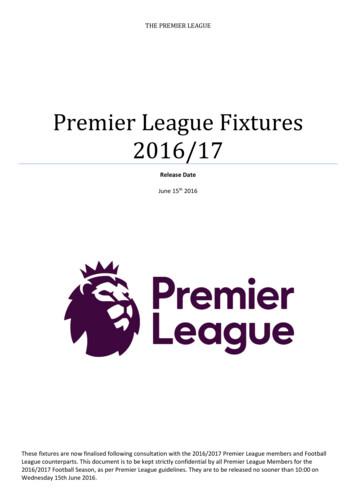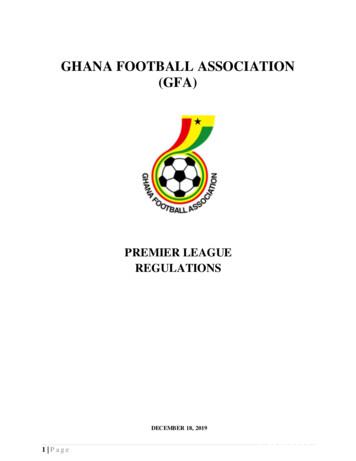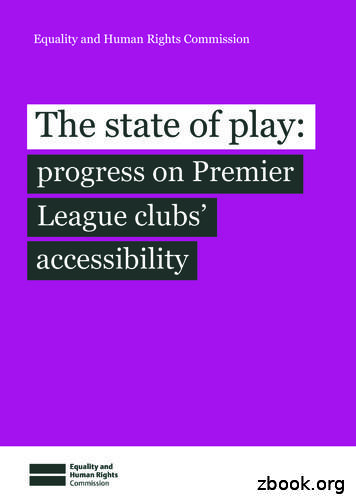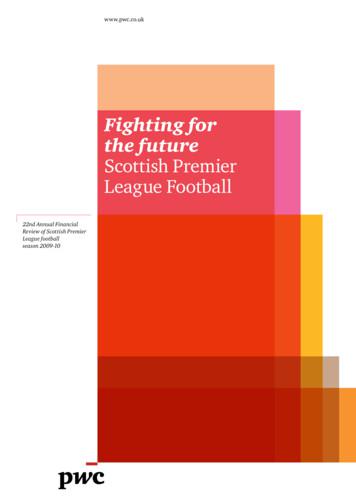Youth Development Rules - Premier League
Youth Development RulesSeason 2019/20
Youth Development Rules02Youth Development Forms96Appendix 12134Youth Development Rules:Section S140
Youth DevelopmentRules
GeneralNote: throughout this document binding Premier League Rules are shaded in light grey. Guidance and othernotes are also included for the assistance of Clubs. Such guidance and notes do not, however, form part of theRules.GuidanceThe responsibilities of a Club in relation to Duty of Care continue.DefinitionsRule 1 sets out definitions used in the Youth Development Rules. All other capitalised terms used in thissection of the Rules are defined in Premier League Rule A.1.1.In this section of the Rules the following terms shall have the following meanings:1.1.“Academy” means an establishment for the coaching and education of AcademyPlayers operated by a Club in accordance with the requirements of this Section ofthe Rules and licensed by the PGB pursuant to Rule 14;1.2.“Academy Doctor” means the Official referred to in Rule 99;1.3.“Academy Financial Information” means a budget for the following season,together with a comparison of the budgeted and actual figures for the previousseason, all of which information shall be set out in the format to be prescribed bythe League;1.4.“Academy Management Team” has the meaning set out in Rule 50;1.5.“Academy Manager” means the Official responsible for the strategic leadershipand operation of a Club’s Academy, whose role and responsibilities are moreparticularly defined at Rules 52 to 58;1.6.“Academy Nutritionist” means the Official referred to in Rule 88;1.7.“Academy Operations Manager” means the Official referred to in Rule 60;1.8.“Academy Performance Plan” means a document which sets out the goals,strategy and measurable short-term and long-term performance targets for allaspects of the work of the Club’s Academy, such strategy and performance targetsto be consistent with the Club’s Vision Statement, Coaching Philosophy and PlayingPhilosophy and, where appropriate, details how the Academy will deliver andintegrate its coaching, Education, Games and Sports Science and Medicine/Performance Support Programmes;1.9.“Academy Player” means a male player (other than an Amateur Player, NonContract Player (in The Football League) or a Trialist) who is in an age groupbetween Under 9 to Under 21 and who is registered for and who is coached by, orplays football for or at a Club which operates an Academy pursuant to these Rules,save for any player who:(a) the Board is satisfied has developed technical, tactical, physical,psychological and social skills of such a level that he would not benefitfrom continued coaching in the Academy or participating or continuing toparticipate in its Games Programme (which includes, for the purpose ofthis definition, the league competition referred to in Rules 161 to 168); and(b)4It is emphasised that Academy Players aged 17 or older may no longer be classified as such only wherethe Board approves an application by the Club in light of all the circumstances relevant to the particularAcademy Player and on such terms as the Board considers appropriate.Clubs’ attention is drawn to Rule 73 which requires Clubs to develop and implement a procedure to enablethe transition of Academy Players to the senior squad, and also to Rule 118.1 which provides that eachAcademy Player has access to coaching tailored to his individual needs. Any decision by a Club to ceasetreating an Academy Player as such where it is not reasonable to do so in light of his overall developmentand skill level may be treated at being a breach of this Rule.1.10.“Academy Psychologist" means the Official referred to in Rule 110;1.11.“Academy Return Date” means the date specified as such by the Premier League;1.12.“Academy Secretary” means the Official referred to in Rule 61;1.13.“Academy Staff” means those Officials of a Club employed or otherwise engagedto work in the Club’s Academy;Youth Development RulesYouth Development RulesGeneralGuidanceThe term “employ” is used in the Rules with reference to Academy Staff, but it is accepted that therelationship need not necessarily be one of employment. For example, a Club may enter into acontract for services with Part Time youth coaches whereby no employment relationship will arise.Any references to “employ” or “employment” in this section of the Rules shall be interpretedaccordingly.1.14.“Academy Standards Application” means the online system:(a) through which Clubs are required to complete the self-assessment referredto in Rule 7, as part of the ISO process for the auditing of Academies;(b) through which the ISO provides feedback to Clubs as part of the multidisciplinary assessment referred to in Rule 9.2; and(c)1.15.through which quantitative data can be provided to Clubs;“Artificial Surface” means a playing surface which in the reasonable opinion of theLeague meets the requirements of the FIFA Quality Programme for Football Turf andany new outdoor or indoor Artificial Surface pitch installed by a Club which operatesor applies to operate a Category 1 Academy must achieve the ‘FIFA Quality’ ratingunder the FIFA Quality Programme for Football Turf;GuidanceTo achieve and maintain the ‘FIFA Quality’ rating under the FIFA Quality Programme for Football Turf,the Artificial Surface pitch needs to be certified on an annual basis by a FIFA accredited agent.Existing Artificial Surface pitches have a natural life span. Accordingly, as they reach the end of theirnatural life span, they should be replaced with pitches that achieve the necessary star rating underthe FIFA Quality Programme for Football Turf. has entered into a written contract of employment in Form 16 with that Club;5
General“Authorised Games” means:(a) international matches arranged by a national association includingpreparation and trials therefor;(b) matches in which the Academy Player plays for the Club holding hisregistration:(i)in its first teams;(ii)which are comprised in a Games Programme; or(iii) which are comprised in Festivals or Tournaments, participation inwhich is limited to Academy teams or which are sanctioned by TheFootball Association or by a foreign national association;(c) friendly matches organised by the Club holding the Academy Player’sregistration and played at an Academy, participation in which is limited toAcademy Players registered at an Academy or Trialists but excludingmatches between two teams consisting of one Club’s Academy Players;(b) a summary of the Club’s obligations to the Academy Player, and theAcademy Player’s obligations to the Club;1.20.“Chief Executive” means the Official referred to in Premier League Rule J.1.1;1.21.“Club Board” means those Directors of the Club whose particulars are registeredunder section 162 of the Act;1.22.“Coach Competency Framework” means a document which sets out the keycompetencies and behaviours which the Club expects its Academy coaches topossess and demonstrate;1.23.“Coaching Curriculum” means a Club’s coaching curriculum which must be set outin writing and include:(a) the technical, tactical, physical, psychological and social skills that the Clubwishes its Academy Players to develop;(b) the appropriate means of coaching Academy Players in order that theydevelop those skills (having due regard to their age); and(d) friendly matches against any opposition played outside the season datesset out in the Games Programme Schedule in which the Academy Playerplays for the Club holding his registration;(e) matches organised by the English Schools Football Association orIndependent Schools Football Association or an association affiliated toeither of such Associations in which the Academy Player plays with the prioragreement of his Parents (in the case of an Academy Player under the ageof 18 years), all participation in such matches to be notified by the AcademyPlayer to the Club holding his registration;(f) trial matches for other Clubs or Football League clubs in which theAcademy Player plays with the prior written permission of the Club holdinghis registration; or(g)1.17.(c)“Coaching Philosophy” means a written statement which sets out in detail(including by describing the content of individual coaching sessions for eachAcademy Player) the means by which the Club will coach its Academy Players in eachage group so that they have the best opportunity to develop the technical, tactical,physical, psychological and social skills that the Club wishes players in each positionon the pitch to acquire, as set out in the Club’s Playing Philosophy;1.25.“Continued Professional Development” means ongoing training for AcademyStaff, relevant to their discipline, of such quality, content and frequency as isnecessary to ensure that each member of Academy Staff has the necessaryknowledge and expertise in order to fulfil his role;1.26.“Core Coaching Time” means between 8.30am and 5.30pm on Mondays to Fridays,save that in the Foundation Phase and Youth Development Phase it also includesbetween 9am and 5pm on Saturdays;1.27.“Development Action Plan” means an individualised plan, developed andimplemented in accordance with these Rules, for the professional development of anAcademy coach;GuidanceThe BFAS will need to be renewed every three years (it is hoped as part of the renewal of the mainAcademy coaching qualifications).1.18.1.19.“Category” means one of the four categories into which each Academy shall beassigned in accordance with the criteria and procedures set out in this section of theRules, and “Category 1”, “Category 2”, “Category 3” and “Category 4” shall beconstrued accordingly;“Charter for Academy Players and Parents” means the information to beprovided by the League to the Parent of each Academy Player upon each occasionof his registration for a Club and which will contain:(a) information about the consequences of the Academy Player becomingregistered with a Club; and6specific coaching curricula for each Development Phase;1.24.any other match authorised by the Board;“Basic First Aid for Sport Qualification” means the qualification of that nameissued by or on behalf of The Football Association;Youth Development Rules1.16.GeneralGuidanceSee further Rules 77 to 80.1.28.“Development Centre” means an establishment operated by a Club in England orWales for the coaching of Children which is not an Academy and includes any suchestablishment by whatever name or title it is known;1.29.“Development Phase” means the Foundation Phase, the Youth DevelopmentPhase or the Professional Development Phase as the context requires, and“Development Phases” means all of the former;7
General1.31.“Duty of Care” means the responsibility of each Club to promote, protect andsupport the individual wellbeing of each Academy Player and member of AcademyStaff, within the Academy, in accordance with the following pillars:Education (see Rules 173 to 189);(b)Personal development and life skills (see Rules 190 to 193);1.41.“Foundation Phase” means the Under 9 to Under 11 age groups inclusive;(c)Inductions and transitions (see Rules 194 to 198);1.42.(d)Academy Player and Parent voice (see Rules 199 to 200);(e)Safeguarding and mental and emotional wellbeing (see Rules 201 to 204);“Foundation Phase Games Programme” means the games programmesorganised by the League and the Football League for teams in each of the Under 9to Under 11 age groups as set out in Rules 134 to 138;(f)Health and safety (see Rules 205 to 206);1.43.(g)Inclusion, diversity and equality (see Rules 207 to 208); and(h)Injury and medical (see Rules 209 to 216);“Full Time” means, when applied to a role specified under these Rules, one wherethe working hours are at least 35 hours per week (subject to such additional hours asthe Club may require). A Full Time role may be fulfilled by more than one Official (e.g.on a job-share basis) provided that the minimum hours stated above are undertaken;“Education Advisor” means, in respect of any Club in membership of the PremierLeague, experts appointed by the Premier League to support the delivery ofeducation to Academy Players, and, in respect of any Club in membership of theFootball League, means the charity, League Football Education;“Education Programme” has the meaning set out in Rule 173;1.33.“EHOC” means the ‘Elite Heads of Coaching’ programme provided by the Leaguefor Heads of Coaching at Category 1, Category 2 and Category 3 Academies and inrespect of which additional funding is available from the League in the event of Clubparticipation;1.34.“Elite Academy Managers Development Programme” or “EAM” means thedevelopment programme provided by the League for Academy Managers;1.35.“Elite Player Performance Plan” means the document of that name dated May2011 and presented to the General Meeting held on Thursday 2 June 2011;1.36.“Emergency Action Plan” means a plan detailing the medical facilities andpersonnel who shall be available at each Club’s home matches in the GamesProgrammes, and the contingency plan for how any medical emergencies at suchmatches shall be dealt with;1.37.“Emergency First Aid in Football” or “EFAiF” means the qualification of that nameissued by or on behalf of The Football Association;1.38.“FA Advanced Youth Award” means the advanced qualification for Academycoaches to be developed and awarded by The Football Association;GuidanceThe FA Advanced Youth Award contains a specialist element relevant to each Development Phase.Coaches will be required to hold the specialism relevant to the age group that they coach.8“Festival” means an event, which may be spread over more than one day, at whichteams from three or more Clubs (or clubs) play a series of matches in an environmentin which the matches are competitive but the results are not given any particularsignificance;(a)1.32.1.39.1.40.Youth Development Rules1.30.GeneralGuidanceA Club will not be penalised should a member of its Academy Staff fulfilling one of the roles required by theseRules to be Full Time if working slightly less than 35 hours per week provided that the required outputs of thatrole are being satisfactorily delivered. See further, by way of comparison, Rule 45 and the guidancethereunder.1.44.“Full Time Education” means the education provided for registered pupils atprimary or secondary schools or full-time equivalent students at colleges of furthereducation;1.45.“Full Time Training Model” means:(a) in the Professional Development Phase, a programme of coaching andeducation whereby the Academy Player’s academic education shall bescheduled to enable four hours of coaching per day (which may be splitinto two sessions of two hours each) to take place within the Core CoachingTime; and(b) in the Youth Development Phase, a programme which complies with thefollowing:(i) the Academy Player shall receive within the Core Coaching Time aminimum of twenty hours of education;(ii) the Academy Player shall receive a significant amount of coachingwithin the Core Coaching Time. The exact amount of suchcoaching to take place within the Core Coaching Time is to bedetermined by the Club for each individual Academy Player. TheClub shall demonstrate the amount of coaching is significantlymore than the amount of coaching in the Core Coaching Timewhich the Club gives to its Academy Players engaged on theHybrid Training Model. Full details must be set out in the AcademyPlayer’s individual coaching plan referred to in Rule 118;“FA Youth Award” means the non-age specific qualification for Academy coachesawarded by The Football Association;9
GeneralGeneralGuidanceClubs’ attention is drawn to Rule 181.2, pursuant to which they must provide all necessary additionaleducational support so that the Academy Player’s education is not prejudiced as a result of beingreleased from school to undertake coaching during the Core Coaching Time.1.53.“Individual Learning Plan” means an individual plan for each Academy Playersetting out measurable objectives for the development that he needs to undertakeand the means by which he will obtain those objectives;1.54.“Induction and Transition Strategy” means the documented plan in place ateach Club, agreed by the Technical Board, designed and implemented to supportAcademy Players in their arrival to and departure from the Club, for whatever reasonand whatever age sal2014 15 eneu neutral.pdf1.55.“Intermediate Trauma Medical Management in Football” or “ITMMiF” meansthe qualification of that name issued by or on behalf of The Football Association;1.47.“Games Programme” means the Foundation Phase Games Programme, the YouthDevelopment Phase Games Programme, or the Professional Development PhaseGames Programme;1.56.“ISO” means Professional Game Academy Audit Company or such other independentstandards organisation appointed from time to time by the PGB for the purposes ofundertaking the ISO Audits;1.48.“Games Programme Schedule” means the period during which matches in theGames Programmes shall take place;1.57.“ISO Audit” means the process of independent auditing of Clubs’ Academies inaccordance with Rule 6 to Rule 12, including a process of self-assessment by eachClub, and a multi-disciplinary assessment by the ISO;1.58.“Learning Management System” or “LMS” means the online system provided bythe League for the upload and storage of educational data and informationregarding Academy Players;1.59.“Multi-disciplinary Review” means a review of all aspects of an Academy Player’sfootball, athletic and educational performance and development and which shallinclude:(iv) the Club’s delivery of the Full Time Training Model must complywith these Rules;1.46.“Futsal” means the variant of association football that is played in accordance withthe Futsal Laws of the Game as published from time to time by FIFA (with any suchvariation thereto as the League may from time to time determine), the current suchLaws being available at:GuidanceThe Games Programme Schedule incorporates two periods of “downtime” for matches in the FoundationPhase and Youth Development Phase Games Programmes. The first such period generally encompassesthe last two weeks of July and the first two weeks of August, and the second encompasses two weeks overChristmas. The exact dates for each season’s period of downtime will be set out in the Games ProgrammeSchedule when it is published by the League in the preceding season. A provisional date of 31 January ineach season has been set for the publication of the Games Programme Schedule (although it may besubject to amendment thereafter but before the start of the following season to accommodate, forexample, newly-classified or re-classified Academies).(a) reports from all relevant Academy Staff (including from the coaching,education and sports science and medicine/performance supportdisciplines);The League will conduct regular consultation meetings with Clubs to consider the Games ProgrammeSchedule for the following season.1.49.“Head of Academy Coaching” means the Official referred to in Rule 63;1.50.“Head of Education” means the Official referred to in Rule 104;1.51.“Head of Recruitment” means the Official referred to in Rule 106;1.52.10“Hybrid Training Model” means a programme of coaching and education wherebythe coaching of an Academy Player primarily takes place outside the Core CoachingTime save that, subject to the provisions of these Rules, he may be released fromattendance at school during the School Day for a maximum of half a day a week (ifhe is in the Foundation Phase) or two days a week (if he is in the Youth DevelopmentPhase);Youth Development Rules(iii) no single coaching session shall endure for more than 90 minutes,and if there are two or more coaching sessions on a single day,there shall be a period of rest between each session sufficient toensure that the Academy Player is fully rested, and of at least 90minutes’ duration, unless the Academy Player’s individual coachingpl
Youth Development Rules 02 Youth Development Forms 96 Appendix 12 134 . Coaching Philosophy and Playing Philosophy and, where appropriate, details how the Academy will deliver and . organised by the League and the Football League for teams in each of the Under 9 to Under 11 age groups as set out in Rules 134 to 138;
THE PREMIER LEAGUE Premier League Fixtures 2016/17 Release Date June 15th 2016 These fixtures are now finalised following consultation with the 2016/2017 Premier League members and Football League counterparts. This document is to be kept strictly confidential by all Premier League Members for the 2016/2017 Football Season, as per Premier .
Association Premier League Regulations" and the provisions shall be referred to as Articles, Clauses and Sub-Clauses. 2. Control of the Premier League The control and management of the Premier League in the country shall be vested in the GFA. 3. Laws of the Game Each Member of FIFA shall play Association Football in compliance with the Laws of
In September 2015, all Premier League clubs committed to ensuring that by August 2017 they would meet the standards set out in the ASG. This 'Premier League Pledge' was voluntary, but clubs all have legal obligations under the Act. In December 2016, the Commission wrote to all 20 Premier League clubs asking for
Club International: Champions League, Champions League Qualification, Europa League (from round 16), Europa League Qualification, UEFA Super Cup, AFC Champions League, Copa Libertadores, Copa Sudamericana Live Stats leagues The details covered vary from league to league. We have list
Little League Baseball Umpire School Rules Instruction Manual 3 LITTLE LEAGUE REGULATIONS . I - The League . Consult appropriate Little League rulebook for additional information. (c) 9 Note 1: Little League International currently provides each league with access to 125 free criminal background checks per year.
of Scottish Premier League (SPL) football. compared to the previous season's run in the Champions League group stage. Making reasonable adjustments for these items shows that the league generated an underlying loss of c 16m. Adjustments ( m) Headline profit 1 Less: exceptional profit adjustment (7) Less: Champions League profit adjustment (10)
Premier League and its clubs (the 'League') have achieved considerable success, establishing a strong global reputation for high-quality and entertaining football, as well as delivering substantial economic and social impacts. Economic impact The Premier League's significant contribution was felt across
Adolf Hitler Translated into English by James Murphy . Author's Introduction ON APRIL 1st, 1924, I began to serve my sentence of detention in the Fortress of Landsberg am Lech, following the verdict of the Munich People's Court of that time. After years of uninterrupted labour it was now possible for the first time to begin a work which many had asked for and which I myself felt would be .























